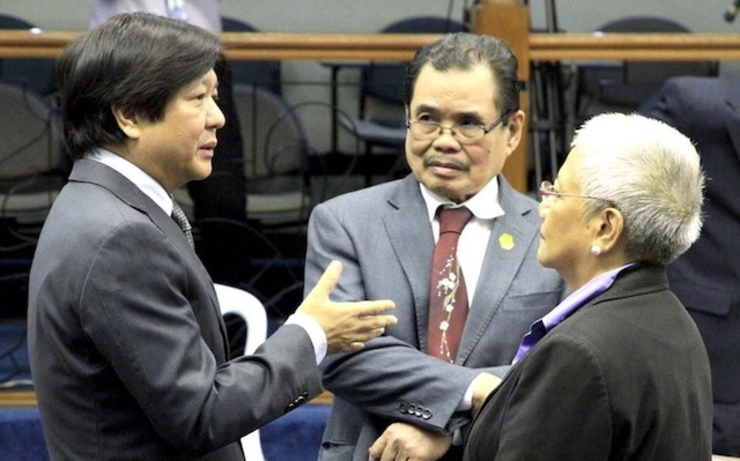Senator Ferdinand Marcos Jr urges colleagues to resolve the issue of how to tackle constitutional issues given the deadline for passing the bill by March 2015

HEARINGS. Senator Bongbong Marcos (left), chair of the Senate Committee on Local Government, talks to Office of the Presidential Adviser on the Peace Process (OPAPP) Secretary Teresita Quintos-Deles (right) and Bangsamoro chairman Mohaguer Iqbal (center) before the start of a briefing on the proposed Bangsamoro Basic Law. File photo by Albert Calvelo/PRIB
Senator Ferdinand
"Bongbong" Marcos Jr on Tuesday, January 20, warned that the passage
of the proposed Bangsamoro Basic Law could
be delayed if the issue on how constitutional issues should be tackled is not
resolved soon.
While their
counterparts at the House of Representatives are set to conduct their final
public hearing on the issue on Wednesday, January 21, the Senate is still set
to conduct 4 more hearings.
Senator Miriam
Defensor Santiago, chair of the committee on constitutional amendments and
revision of codes, has scheduled hearings on January 26 and February 2,
focusing on the constitutional aspects of the measure.
Meanwhile, the
main committee handling the bill – the committee on local government, chaired
by Marcos, with the assistance of the committee on peace and unification
chaired by Senator Teofisto Guingona III, also scheduled hearings in Jolo and
Zamboanga on February 4 and February 5.
To fast-track the
proceedings and help the Senate beat the deadline for passing the bill by March
2015, Santiago and Marcos are willing to conduct parallel hearings together. Santiago
The arrangement
was supposed to be formalized on the floor on Tuesday. However, the Senate
plenary – upon the suggestion of Senate President Franklin Drilon – decided to
refer the matter to the committee on rules instead of resolving it right away.
Marcos said he
referred all constitutional questions to Santiago
Senate Minority
Floor Leader Vicente Sotto III, however, questioned the involvement of a 3rd
committee.
He said the
committee on local government should first conclude hearings with the peace and
unification committee, and then work with Santiago
This was not an
issue at all at the House of Representatives. In September 2014, Speaker
Feliciano Belmonte Jr moved to a create a supercommittee
composed of 75 members once it was confirmed that the bill was ready.
In a separate
interview, Drilon gave assurances that the Senate will pass the Bangsamoro
Basic Law by March 18, the last day of session before the long summer break.
Once it hurdles
Congress, the measure needs to be approved in a plebiscite. The government
hopes to conduct the plebiscite by May to give the Moro Islamic Liberation
Front (MILF) at least one year to lead the transition toward the Bangsamoro.
Drilon said he
hopes the committees would invite members of the 1986 Constitutional Commission
in the succeeding hearings.
Earlier, majority
of the surviving framers of the
Constitutional Commission pledged their support for the proposed Bangsamoro
Basic Law – a product of the final peace accord between the
government and the MILF.
The measure,
which seeks to create a parliamentary form of autonomous region with greater
fiscal and political powers, aims to end 4 decades of war in Mindanao .

No comments:
Post a Comment
Note: Only a member of this blog may post a comment.